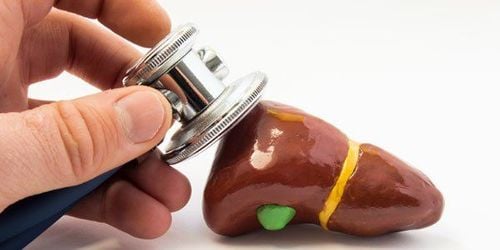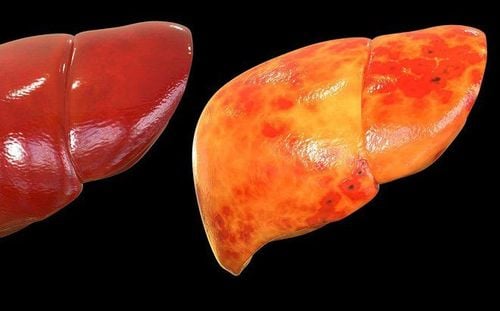This is an automatically translated article.
Autoimmune hepatitis is a disease in which the body's immune system causes an inflammatory response that attacks liver cells. The disease is chronic, lasts many years, and can lead to cirrhosis if left untreated. Therefore, early diagnosis with diagnostic tests for autoimmune hepatitis is extremely important to preserve liver function.
1. What is autoimmune hepatitis?
Autoimmune hepatitis is inflammation that occurs in the liver parenchyma when the body's immune system fights against liver cells. The exact cause of autoimmune hepatitis is still not well understood. However, a number of hypotheses have been proposed that the pathogenesis is the involvement of genetic and environmental factors, the involvement of infectious agents interacting with each other over time, and the importance of time. significance in disease activation.
Although the etiology is ambiguous, certain factors have been observed that may increase the risk of autoimmune hepatitis such as female gender, previous infection with measles, herpes simplex, Epstein-Barr virus or hepatitis A, B or C, run in the family or have an autoimmune disease...
If autoimmune hepatitis is left untreated it can lead to cirrhosis and eventually to liver failure. liver failure as well as an increased risk of liver cancer. At the same time, patients are also at risk of other extra-hepatic complications such as gastrointestinal bleeding due to esophageal varices, peritonitis due to ascites, hepatorenal syndrome ...
However, when diagnosed With early diagnosis and treatment, autoimmune hepatitis can be controlled with medications that suppress the immune system. Since then, the healthy liver parenchyma is preserved and the liver function will improve somewhat. In addition, liver transplantation may be an optimal choice when autoimmune hepatitis does not respond to drug therapy or in cases of rapidly progressing liver disease, which is life-threatening.
It is for these reasons that it is important to diagnose autoimmune hepatitis as early as possible, providing long-term prognostic implications for the patient's life. The examination procedures and necessary autoimmune hepatitis tests are presented in turn below.
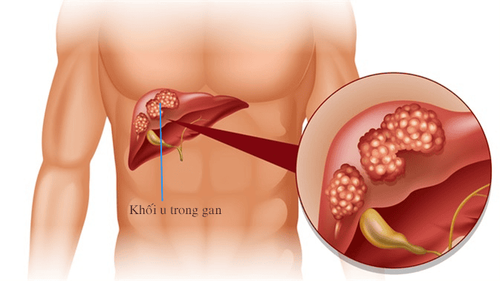
Viêm gan tự miễn tăng nguy cơ gây ung thư gan
2. Signs to diagnose autoimmune hepatitis
Doctors diagnose autoimmune hepatitis based on your medical history, medications or foods that can harm your liver. For example, your doctor needs to know about any medications, including prescription and nonprescription drugs, supplements and herbal products you've taken, how much alcohol you drink each day, and for how long. how long. In addition, your doctor will also ask you about other autoimmune conditions you may have, such as inflammatory bowel disease or thyroid dysfunction.
The next step is to see a doctor to check for signs of liver damage as follows:
Yellow color of the whites of the eyes (scleroderma) Skin changes, lesions Enlarged liver or spleen Pain or a feeling of swelling in the abdomen Swelling in the insteps, feet, or ankles

Đau tức bụng là triệu chứng thường gặp
3. Tests to diagnose autoimmune hepatitis in the blood
Blood test is a basic subclinical for diagnosing autoimmune hepatitis, even when the patient is completely asymptomatic and abnormality on the test is discovered by chance during routine health examination or because other diseases.
Furthermore, the signs and symptoms of autoimmune hepatitis are varied, nonspecific, and vary from person to person. Therefore, the doctor needs to appoint a blood test as the first basic step in the diagnostic tests for autoimmune hepatitis as an objective evidence.
Blood tests include tests that check levels of the liver enzymes alanine transaminase (ALT) and aspartate transaminase (AST). ALT and AST are especially important because these liver enzymes are elevated in people with autoimmune hepatitis. Testing of ALT and AST levels is also used to monitor disease progression and response to treatment later in life.
In addition, the doctor will also order additional blood tests to look for other liver diseases that have similar symptoms to autoimmune hepatitis and are accompanied by elevated liver enzymes, such as viral hepatitis, primary cholangitis , primary sclerosing cholangitis, nonalcoholic steatohepatitis, or Wilson's disease.
When liver enzymes are elevated, the presence of autoantibodies such as antinuclear antibodies (ANA) and anti-smooth muscle antibodies (SMA) will be evidence of autoimmune liver damage. . Even so, in about 20% of patients with autoimmune hepatitis who may not have ANA or SMA, additional antibodies may be present, such as anti-soluble (anti-SLA), anti-LC1 liver antibodies. and anti-hepato-renal microsomal antibody type 3 (anti-LKM3). Simultaneously, elevated gamma globulin scores also occur in 80% of autoimmune hepatitis cases. Once there is an increase in liver enzymes along with an increase in gamma globulin levels, this is an important sign that the disease is in an active phase.
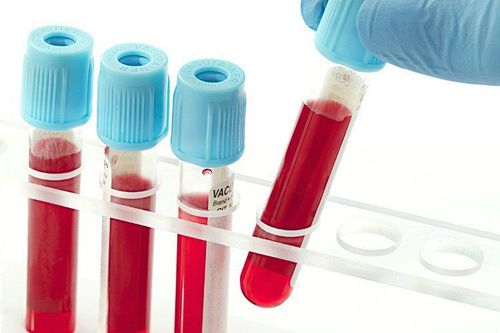
Xét nghiệm máu giúp chẩn đoán bệnh
4. How are imaging tests in the diagnosis of autoimmune hepatitis?
In addition to blood tests, your doctor may order imaging tests in your abdomen and liver structure to diagnose autoimmune hepatitis.
The most commonly used imaging tools are ultrasound. Ultrasound collects images based on the principle of sound waves, which are transmitted and received through a device called a transducer. This vehicle is safe, painless, and produces images of the liver or abdominal organs. The results of ultrasound may show an enlarged liver, abnormal shape or texture in the liver parenchyma, or blocked bile ducts.
In addition to liver ultrasound, the follow-up sometimes ordered is computed tomography (CT). Using a combination of X-rays and computer technology to build an image, a CT scan can show the size and shape of the liver and spleen and whether there is evidence of cirrhosis. Similar to CT is magnetic resonance imaging (MRI), the shape and size of the liver and detecting evidence of cirrhosis will also be observed more clearly with radio waves and magnets instead of X-rays.
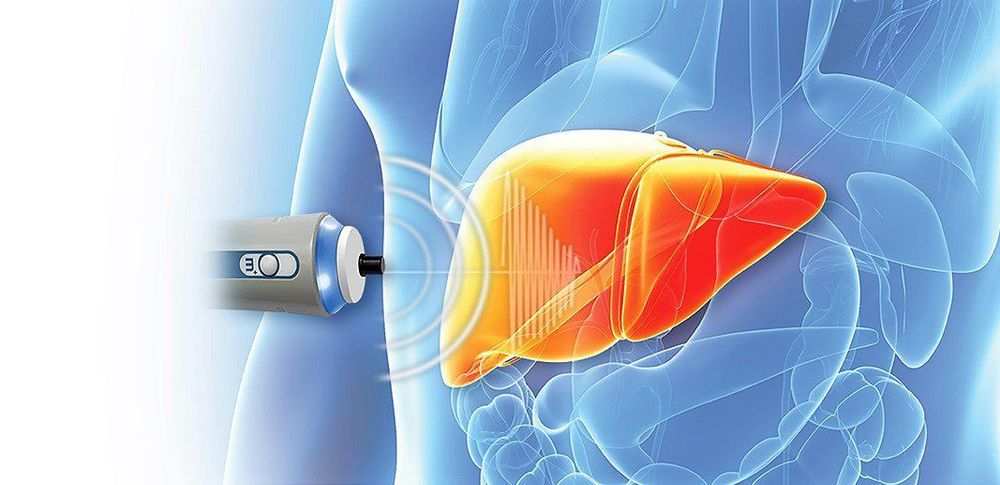
Siêu âm gan được thực hiện để chẩn đoán hình ảnh
5. Liver biopsy in the diagnosis of autoimmune hepatitis
Liver biopsy in particular, organ tissue biopsies in general, is the "gold standard" in the definitive diagnosis of all types of histological pathology. Although this is an invasive means, there can be many complications when intervention, this indication is really necessary in cases of liver damage, cirrhosis of the liver with no obvious cause.
During a liver biopsy, the doctor removes a piece of tissue directly from the liver. Samples will be sent to the laboratory, processed through several stages. Next, a pathologist examines liver cells under a microscope to look for the extent of damage and features of specific liver diseases. At the same time, the doctor can also use the liver biopsy sample to classify autoimmune hepatitis and check the number of scars and mutated cells to detect early complications of cirrhosis and liver cancer.
In summary, autoimmune hepatitis is a relatively uncommon disease in the community, and the diagnosis of autoimmune hepatitis generally requires several steps and coordinated means. The most basic diagnostic test for autoimmune hepatitis is the presence of unexplained elevations in liver enzymes associated with the presence of autoantibodies. However, biopsy evidence is the "gold standard" in the diagnosis of autoimmune hepatitis as well as the prognosis for patients.
When there are suspected signs of autoimmune hepatitis, you can go to Vinmec International General Hospital for examination and treatment. There is a team of well-trained, experienced and specialized gastroenterologists and a system of modern and international-standard equipment for high diagnostic and treatment efficiency.
For detailed medical advice, please come directly to Vinmec health system or register online HERE.








